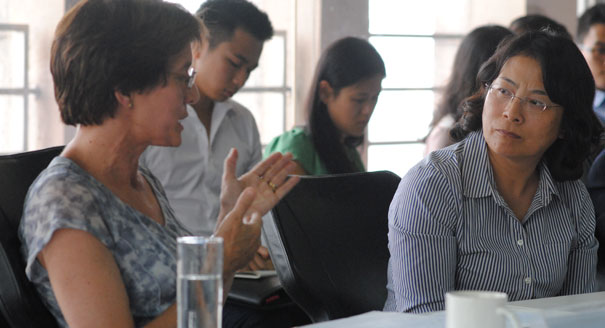Registration
You will receive an email confirming your registration.
While U.S.-China cooperation on security issues has been a central tenet to the bilateral relationship, the two countries continue to encounter misunderstandings and need to find mutual areas of interest to collaborate on. Much attention has been focused on traditional security cooperation between China and the United States. However, there is a growing demand for bilateral solutions on nontraditional security issues, such as energy security and terrorism.
Carnegie–Tsinghua’s Zhang Chuanjie hosted a roundtable discussion featuring several Chinese and American experts from the University of Maryland, Tsinghua University, Peking University, China Institute of International Studies, and the Chinese Academy of Social Sciences. They discussed the traditional and non-traditional security issues facing both countries, how these issues affect each country, and ways in which the United States and China can work together.
Discussion Highlights
- Countering Climate Change Effects: Panelists agreed that even if there is disagreement over the exact effects of climate change, the need to reduce energy consumption, particularly from fossil fuels, is indisputable. One expert emphasized the need to consolidate energy control between governments through mechanisms such as developing a world standard accounting system with high accuracy for nuclear isotopes.
- Traditional Security Cooperation: An expert stated that current U.S.-China cooperation on traditional security has not made positive progress. The expert attributed this stagnancy to a difference in terminology and logic, uncertainty of the other country’s intentions, and a growing number of policymakers who think agreements, such as the ones for arms control, are unnecessary due to political and negotiating costs. She argued that a new logic and methodology for cooperation must be jointly developed by the two countries.
- Energy Security: Panelists discussed the issue of China’s growing imbalance between its oil supply and demand. One panelist noted that 60 percent of China’s oil supply is from foreign sources. The only domestic oil sources are via the Central Asia pipeline or China’s coastal areas. The panelist noted that China needs more stable foreign supplies of oil and thus should give more attention to North American producers.
- Managing Coal Emissions: Panelists agreed that China and the United States can cooperate to mitigate coal emissions due to a mutual desire to limit pollution. Panelists suggested more technology and policy collaboration and that both countries actively promote electric vehicle use.
- Establishing Norms: Panelists discussed measures to ensure adherence to cooperation agreements on nontraditional security issues. They listed a number of chief considerations, including the fact that the jointly developed rules must be perceived as fair, the process must be seen as legitimate, and that the agreements must have systematic reassurance and transparency. Both countries need to work to understand the other’s concerns and ensure that any cooperative agreements reached address those concerns, panelists concluded.
Discussants: Jonas Siegel, Steve Fetter, Liu Feitao, Shen Peng
